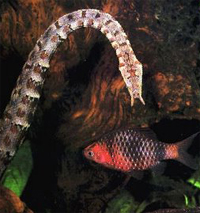Animals
Badger Casserole
It's all badgers, all the time, here at WU!
Posted By: Paul - Tue Jul 28, 2009 -
Comments (2)
Category: Animals, Food, Transportation
Badger Song
The Badger Song - More amazing videos are a click away
In honor of Chuck's "Badger Whisperer" post.
Posted By: Paul - Mon Jul 27, 2009 -
Comments (11)
Category: Animals, Music, Cartoons, Natural Wonders
Your Daily Loser, In Couple Form and Another Animal Found Where It Didn’t Belong
Things sure have changed since I was a kid and fast food worker (about ten years ago). Back then the fast food workers would've been high and hoping the customers didn't notice, but last Friday it was an Arby's employee calling to report a drive-thru customer indulging with his girlfriend and one-year-old in the car. The boyfriend is free on bond after charges of neglect of a dependent and possession of marijuana were filed against him. The Indy StarAnd from Rensselaer, Indiana comes a report of a 17 and 14-year-old who finally slaughtered a 150 pound, 6 foot long, alligator with a shotgun after their frog spears failed to do the trick. And no, they will not face criminal charges since alligators are not considered a game species in Indiana. The Indy Channel
Posted By: qualityleashdog - Tue Jul 14, 2009 -
Comments (12)
Category: Animals, Stupid Criminals, Babies and Toddlers, Your Daily Loser
Swine Ebola - No Joke!

In this case it seems like most likely that the pigs caught the disease from the human rather than the other way round. However that pigs can catch and potentially pass on the organism to humans is an unexpected, and worrying, development. Michael McIntosh of the Department of Agriculture expressed concern not only that the Reston strain might mutate into something more deadly in its new host, but that the other disease-causing strains might also be using pigs as a reservoir. "What is the level of risk?" said McIntosh, "We really don't know" (Scientific American Article) (Paper in Science).
Posted By: Dumbfounded - Sat Jul 11, 2009 -
Comments (8)
Category: Agriculture, Animals, Armageddon and Apocalypses, Food, Health, Disease
Weird Science - Biology
Men are now obsolete, thanks to work by scientists at the Northeast England Stem Cell Institute. Professor Karim Nayernia and team have managed a "scientific first" by inducing stem cells into becoming artificial sperm in laboratory conditions. In mice, these sperm have proven able to fertilise eggs and produce viable offspring, opening the door to potential new infertility treatments in humans. Additionally, the stem cells themselves may come from either sex, raising the possibility of children being born without the traditional male input. Any such treatment is many years away however, and there are still problems to be overcome, not least that all the mice babies so far produced by this technique had abnormally short lives. Nayernia admits that the process is not perfect, but says that it could be ready for human trials in less than ten years (Telegraph).But mothers, don't kick out the old man yet, not if you want a little help with the childcare that is. A team from the "Institut des Sciences de l'Evolution" in France has confirmed a prediction of the theory of evolution that fathers will invest more in children that resemble them. A total of 30 Senegalese families were studied and the paternal investment and resemblance were quantified for each. As expected, there was a significant correlation between the resemblance and investment scores, but also between investment and the nutrition and health of the child. So it seems we fathers still have our uses, for now (Science Daily).
Animals do many weird things to avoid being eaten, from camouflage, to making themselves look bigger or more dangerous, to having a false head or eye on a less vital point to divert attackers. However, one spider has a tactic that's never been observed before; it makes decoy models of itself. The Cyclosa mulmeinensis spider of Orchid Island, near Taiwan, decorates its web with pellets of silk the same size and (to wasps) colour as itself, then hides among them. Researchers from Tunghai University were actually able to observe wasp predators attacking the decoys while the spider escaped, confirming the effectiveness of the trick. The strategy is not without risk though, by having more spider sized blobs on it, the web may also be easier for the wasps to detect (Daily Mail).
More in extended >>
Posted By: Dumbfounded - Wed Jul 08, 2009 -
Comments (6)
Category: Animals, Babies, Family, Insects and Spiders, Medicine, Science, Anthropology
A Little More Light Weirdness
Just some un-themed oddities that caught my eye:Plans to chop down a tree to make way for a roundabout in Jaslo, Poland have revealed that the oak was in fact planted to commemorate Hitler's birthday when the town was occupied during World War 2. The town's mayor, Maria Kurowska, called the choice between traffic improvements and the living memorial "simple," but not everyone agrees. "It's a historic curiosity," said local Kazimierz Polak, who was present at the planting ceremony as a child 67 years ago, adding, "It's not the tree's fault" (Reuters).
Two Bengal white tigers in a zoo in South Africa have given birth to a tiger cub that's not only white, but stripe-less (London Paper). Surely that's just called a lion?
A spiritual "healer" in Puerto Rico may want to re-read the manual today, after accidentally dropping a lit candle into the bath of alcohol he had instructed he lady patient lie in. The victim, who was suffering financial and marriage issues, can now add 50% burns to her list of problems (Metro).
The Swiss state of Appenzell went the whole of the second world war without a single German invader, so was perhaps unprepared to come under sustained assault by German hikers dressed in nothing but their socks and boots. Naked hiking, which has become a popular Alpine pastime apparently, has generated a stream of complaints from Swiss locals, and the authorities of the Outer and Inner Rhodes provinces of Appenzell have responded by imposing stiff fines of 200CHF ($175) on anyone caught without clothes, though where they expect the hikers to produce the money from is not explained (Cape News). To publicise the ban, the Swiss officials have ordered signs banning nude hiking, to the surprise of designer Dan Walter, who originally drew the sign as a joke (Metro).
Posted By: Dumbfounded - Tue Jul 07, 2009 -
Comments (6)
Category: Accidents, Goofs and Screw-ups, Animals, Government, Regulations, Health, History, Historical Figure, New Age
Canadian Snake Mating
I'm sorry I did not learn about the annual snake mating in Manitoba until now, since the peak activity occured around Mother's Day. But maybe you can plan your trip for next year.
Posted By: Paul - Sun Jul 05, 2009 -
Comments (4)
Category: Animals, North America, Natural Wonders
Sneaky Snakes

Posted By: Nethie - Fri Jul 03, 2009 -
Comments (3)
Category: Animals, Food, Nature, Science
Weird Britannia!
Time to point our telescopes of weirdness at "the old country", methinks.
And it's not just British brains that are shrinking, the UK's sheep are getting smaller as well. Because of a trend towards milder weather believed to be due to climate change, Sheep on the Outer Hebridean island of Soay are getting smaller at the rate of 100g/year, say researchers from Imperial College, London. Though it might seem that warmer winters and a greater abundance of food might make for bigger sheep, Tim Coulson, the professor leading the study, points out that fewer weaker and smaller lambs will die over winter, bringing down the average size (Telegraph).
Now, in some good news, UK campaigners have won a second victory in a three-year battle... to bring back a chocolate bar. The "Wispa Bar", made by European confectioners Cadbury, was introduced in 1995 along with a caramel laced version called the "Wispa Gold", only for both to be discontinued in 2003. This prompted some die-hard fans of the bubbly chocolate bar to start a petition to have it go into production again, resulting in a "limited edition" run of the original Wispa last year. When the 40 million bars produced sold out in just 18 weeks, Cadbury decided to relaunch the brand. Not satisfied with just one bar, campaigners have kept up the pressure, causing Cadbury to start producing Wispa Golds "for a limited period," as before. However to some commentators, this latest move looks more like slick PR than grassroots victory (Sky News).
More in extended >>
Posted By: Dumbfounded - Fri Jul 03, 2009 -
Comments (5)
Category: Animals, Food, Candy, Law, Judges, Nature, Weather, Political Correctness, Religion, Products
Alligator Wrestling
Eddie Snyder wrestles gators from jim on Vimeo.
Posted By: Paul - Thu Jun 25, 2009 -
Comments (1)
Category: Animals, Death, Human Marvels, Regionalism, Stupidity

| Who We Are |
|---|
| Alex Boese Alex is the creator and curator of the Museum of Hoaxes. He's also the author of various weird, non-fiction, science-themed books such as Elephants on Acid and Psychedelic Apes. Paul Di Filippo Paul has been paid to put weird ideas into fictional form for over thirty years, in his career as a noted science fiction writer. He has recently begun blogging on many curious topics with three fellow writers at The Inferior 4+1. Contact Us |




